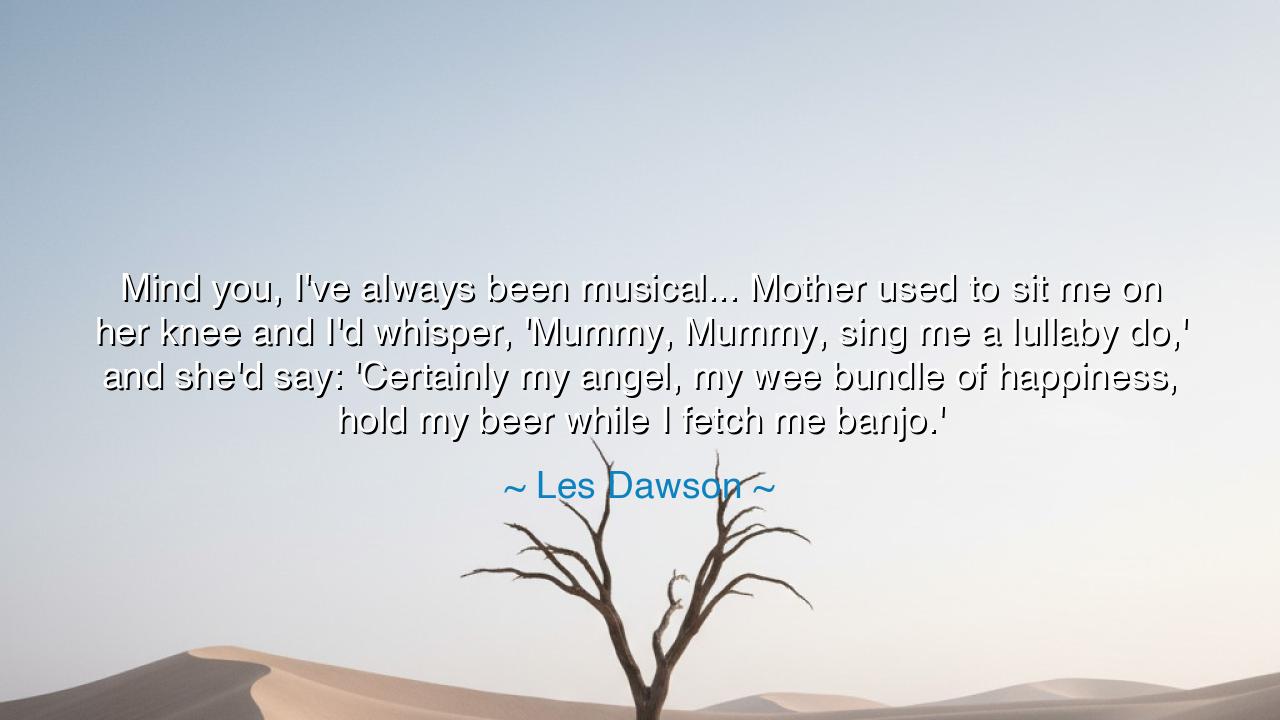
Mind you, I've always been musical... Mother used to sit me on
Mind you, I've always been musical... Mother used to sit me on her knee and I'd whisper, 'Mummy, Mummy, sing me a lullaby do,' and she'd say: 'Certainly my angel, my wee bundle of happiness, hold my beer while I fetch me banjo.'






“Mind you, I’ve always been musical... Mother used to sit me on her knee and I’d whisper, ‘Mummy, Mummy, sing me a lullaby do,’ and she’d say: ‘Certainly my angel, my wee bundle of happiness, hold my beer while I fetch me banjo.’” – Les Dawson
In this humorous and tender recollection, Les Dawson, the beloved English comedian and master of self-deprecating wit, paints a portrait of childhood and family with both irony and affection. Beneath his laughter lies a wisdom both ancient and enduring — that joy, humor, and music are the enduring threads that bind the generations of humanity together. Though his words sparkle with jest, they also carry a quiet truth: that even in humble beginnings, in the rough and imperfect melodies of ordinary life, there is beauty, warmth, and belonging. His story is one of laughter born not from grandeur, but from love, and of music drawn not from instruments alone, but from the soul’s unbreakable harmony.
The origin of this quote lies in Dawson’s own upbringing in the working-class towns of northern England — places where laughter was a form of survival, and music a humble act of transcendence. In such homes, the mother’s lullaby was not always soft and perfect; sometimes it was rowdy, full of life, sung between the clinking of glasses and the creak of old floors. Yet it was there, in that world of simplicity and imperfection, that Dawson’s sense of humor and musicality were born. When he speaks of his mother, banjo in hand, he captures the spirit of those who make joy out of scarcity — the great alchemists of the human heart, who turn hardship into song.
The laughter in his tale is not mockery, but reverence disguised as jest. To say “hold my beer while I fetch me banjo” is to speak in the voice of life’s resilience — a mother who may be rough-edged and weary, yet still answers her child’s call for comfort with music and mirth. It is a picture of love unadorned, the kind that does not need refinement to be sacred. In Dawson’s humor lies a profound acceptance of imperfection, a lesson that even the broken, the weary, and the flawed can create joy. The ancients would have recognized this truth, for they too believed that the gods laughed with the simple-hearted and blessed those who found delight amidst struggle.
Think of the philosopher Diogenes, who lived in poverty and mocked the excess of Athens, yet was richer in spirit than kings. His laughter was his freedom. Like Dawson’s mother, he found beauty not in polished splendor, but in life’s rawness — in the ability to smile at oneself and the world. Or recall the peasant songs of old Europe, sung after long days of toil — melodies imperfect, yet brimming with soul. These songs, like Dawson’s mother’s banjo, were the lullabies of the common heart — music not written for fame, but for family, for survival, for the sacred joy of being alive another day.
Dawson’s story also teaches that humor is a form of courage. In a world often harsh and uncertain, to laugh is an act of rebellion against despair. His mother, though perhaps weary from labor or loneliness, still finds the strength to sing. She refuses to let hardship silence her music. This lesson is as ancient as time — that laughter and song are the shields of the spirit. The Stoics taught that though one cannot always control life’s hardships, one can choose one’s response. Dawson’s humor — rooted in love and irony — is such a response. It is the laughter that redeems pain, transforming it into memory and meaning.
And yet, there is tenderness in his words, for beneath the jest lies the eternal truth of a child’s heart seeking comfort in a parent’s voice. The “wee bundle of happiness” speaks of affection unclouded by formality or pretense. It reminds us that love, even when clumsy, is the most powerful melody of all. The banjo, though perhaps out of tune, becomes an emblem of life’s imperfect harmony — the music that plays not because everything is right, but because the soul insists on singing anyway. In this way, Dawson’s humor becomes almost philosophical — a celebration of imperfection, a hymn to resilience, a dance with the absurd that ends in grace.
So, my children, take this lesson into your hearts: do not wait for perfection before you sing. Do not demand elegance before you laugh. Life, like music, is most beautiful when it is real — when it rings with the laughter of the imperfect and the courage of the joyful. Be like Dawson’s mother: unashamed to be yourself, unafraid to turn pain into play, to meet sorrow with song. For in the end, every heart longs for the same lullaby — not one of flawless harmony, but one that says, “You are loved, you are home, even in the midst of chaos.”
Thus, let your life be a melody of laughter and courage. When the world grows heavy, pick up your banjo — whatever form it takes — and play. For though the strings may buzz and the tune may falter, the spirit that sings through you will be divine. As Dawson reminds us, humor, love, and music are the instruments of the soul, and they will carry you farther than perfection ever could.






AAdministratorAdministrator
Welcome, honored guests. Please leave a comment, we will respond soon